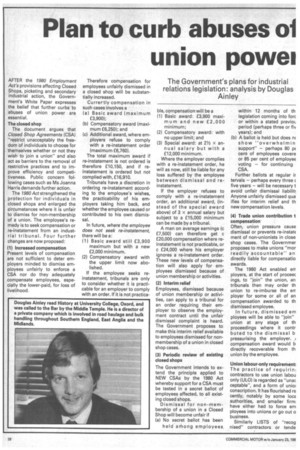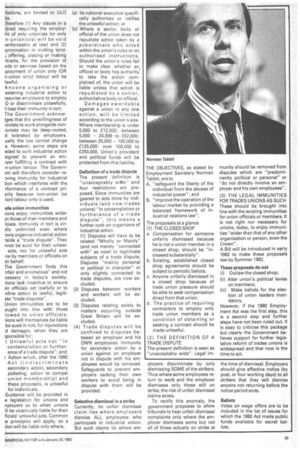Plan to curb abuses 01 union powei
Page 24

Page 25

If you've noticed an error in this article please click here to report it so we can fix it.
The Government's plans for industrial relations legislation: analysis by Douglas Ainley
AFTER the 1980 Employment Act's provisions affecting Closed Shops, picketing and secondary industrial action, the Government's White Paper expresses the belief that further curbs to abuses of union power are essential.
The closed shop The document argues that Closed Shop Agreements (CSA) "restrict unacceptably the freedom of individuals to choose for themselves whether or not they wish to join a union" and also act as barriers to the removal of restrictive practices and to improve efficiency and competitiveness. Public concern following cases such as Ms Joanna Harris demands further action.
The 1980 Act strengthened the protection for individuals in closed shops and enlarged the circumstances where it is unfair to dismiss for non-membership of a union. The employee's remedy is to seek compensation or re-instatement from an industrial tribunal. Four further changes are now proposed: (1) Increased compensation Present levels of compensation are not sufficient to deter employers minded to dismiss employees unfairly to enforce a CSA nor do they adequately compensate employees, especially the lower-paid, for loss of livelihood. Therefore compensation for employees unfairly dismissed in a closed shop will be substantially increased.
Currertly compensation in such cases involves a (a) Basic award (maximum £3,900); (b) Compensatory award (maximum £6,250); and (c) Additional award, where employers refuse to comply with a re-instatement order (maximum £6,760).
The total maximum award if re-instatement is not ordered is therefore £10,150, and if reinstatement is ordered but not complied with, £16,910.
Tribunals have a discretion in ordering re-instatement according to the employee's wishes, the practicability of his employers taking him back, and whether the employee caused or contributed to his own dismissal.
In future, where the employee does not seek re-instatement, there will be a: (1) Basic award still £3,900 maximum but with a new £2,000 minimum.
(2) Compensatory award with the upper limit now abolished.
If the employee seeks reinstatement, tribunals are only to consider whether it is practicable for an employer to comply with an order. If it is not practica ble, compensation will be a (1) Basic award: £3,900 maximum and new £2,000 minimum; (2) Compensatory award: with no upper limit; and (3) Special award: at 21/2 x annual salary but with a £12,000 minimum.
Where the employer complies with a re-instatement order, he will as now, still be liable for any loss suffered by the employee between dismissal and reinstatement.
If the employer refuses to comply with a re-instatement order, an additional award, (instead of the special award above) of 3 x annual salary but subject to a £15,000 minimum can be made by a tribunal.
A man on average earnings (c £7,500) can therefore get c £20,000 compensation where reinstatement is not practicable, or c £24,000 where his employer ignores a re-instatement order. These new levels of compensation will also apply for employees dismissed because of union membership or activities.
(2) Interim relief Employees, dismissed because of union membership or activities, can apply to a tribunal for an order requiring their employer to observe the employment contract until the unfair dismissal complaint is heard. The Government proposes to make this interim relief available to employees dismissed for nonmembership of a union in closed shop cases.
(3) Periodic review of existing closed shops The Government intends to extend the principle applied to NEW CSAs by the 1980 Act whereby support for a CSA must be tested in a secret ballot of employees affected, to all existing closed shops.
Dismissal for non-membership of a union in a Closed Shop will become unfair if (a) No secret ballot has been held among employees within 12 months of th legislation coming into forc or within a stated previoL period (perhaps three or fiv years); and (b) A ballot is held but does m show "overwhelmin support" — perhaps 80 IN cent of employees covere or 85 per cent of employe€ voting — for continuing CSA.
Further ballots at regular ir tervals — perhaps every three c five years — will be necessary t avoid unfair dismissal liabilit Anyone unfairly dismissed qua ifies for interim relief and th new compensation levels.
(4) Trade union contribution t compensation Often, union pressure cause dismissal or prevents re-instatt ment of non-unionists in close shop cases. The Governmer proposes to make unions "mor readily accountable" an directly liable for compensatio awards.
The 1980 Act enabled err ployers, at the start of proceec ings, to "join" the union, an tribunals then may order th union to re-imburse the err ployer for some or all of an compensation awarded to th dismissed employee.
In future, dismissed ern ployees will be able to "join" union at any stage of th proceedings where it contr buted to the dismissal b pressurising the employer. compensation award would b directly recoverable from th union by the employee.
Union labour-only requirement The practice of requirini contractors to use union labou only (ULO) is regarded as "unac ceptable", and a form of unioi conscription. It has flourished re cently, notably by some loca authorities, and smaller firm have either had to force em ployees into unions or go out o business.
Similarly LISTS of "recog nised" contractors or tende Rations, are limited to ULO ns.
"herefore (1) Any clause in a 'area requiring the employmt of only unionists (or only n-unionists) will be void 'enforceable at law) and (2) ;crimination in inviting tend offering, placing or making ltracts, for the provision of. ads or services based on the iployment of union only (OR n-union only) labour will be lawful.
Anyone organising or eatening industrial action to assurise employers to employ 0 or discriminate unlawfully, II lose their immunity in tort. The Government acknowIges that the unwillingness of ionists to work alongside nonionists may be deep-rooted, d tolerated by employers. ually the law cannot change s. However, some steps are eded to curb industrial action signed to prevent an emwer fulfilling a contract with n-union labour. The Governant will therefore consider reDying immunity for industrial tion which interferes with the rformance of a contract pri3rily because non-union (or lion) labour only is used.
sde union immunities lions enjoy immunities wider an those of their members and icials. Immunity in tort is virally unlimited even where ions organise industrial action tside a "trade dispute". They nnot be sued for their unlaw
acts, nor for unlawful acts ,ne by members or officials on 3.ir behalf.
The Government finds this nfair and anomalous" and not .cessary in today's society. lions lack incentive to ensure eir officials act lawfully or to nfine action to lawful, legitiate "trade disputes".
Union immunities are to be ought into line with those lowed to union officials. lions will themselves be liable be sued in tort, for injunctions id damages, when they are sponsible for; ) Unlawful acts not "in contemplation or furtherance of a trade dispute"; and ) Action which, after the 1980 Act (indiscriminate secondary action, secondary picketing, action to compel union membership) and these proposals, is unlawful for individuals.
Guidance will be provided in e legislation for unions and nployers as to when unions ill be vicariously liable for their ficials' unlawful acts. Common w principles will apply, so a lion will be liable only where, (a) Its national executive specifically authorises or ratifies the unlawful action; or (b) Where a senior body or official of the union does not repudiate action taken by a subordinate who acted within the union's rules or on authorised instructions. Should the union's rules fail to make clear whether an official or body has authority' to take the action complained of, the union will be liable unless that action is repudiated by a senior, authoritative body or official.
Damages awardable against a union in any one action, will be limited according to the union's size. Where membership is under 5,000 to 02,500; between 5,000 — 24,999 to £62,000; between 25,000 — 100,000 to £125,000: over 100,000 to £250,000. Union's provident and political funds will be protected from this liability.
Definition of a trade dispute The present definition is "unacceptably witle" and four restrictions are proposed. Since immunities are geared to acts done by individuals (and now trades unions) "in contemplation or furtherance of a trade dispute", this means a further curb on organisers of industrial action.
(1) Disputes will have to be related "Wholly or Mainly" (and not merely "connected with" as now) to legitimate subjects of a trade dispute. Disputes "mainly personal or political in character" or only slightly connected to trade disputes, are now excluded.
(2) Disputes between workers and workers will be excluded.
(3) Disputes relating solely to matters occurring outside Great Britain will be excluded.
(4) Trade disputes will be confined to disputes between an employer and his OWN employees. Immunity for secondary action by a union against an employer not in dispute with his employees would be removed. Safeguards to prevent employers sacking their own workers to avoid being in dispute with them will be provided.
Selective dismissal in a strike Currently, no unfair dismissal claim lies where employers dismiss ALL employees who participate in industrial action. But such claims lie where em ployers discriminate by only dismissing SOME of the strikers. Thus where some employees return to work and the employer dismisses only those still on strike, the risk of unfair dismissal claims exists.
To rectify this anomaly, the government proposes to allow tribunals to hear unfair dismissal complaints only where the employer dismisses some but not all of those actually on strike at the time of dismissal. Employers should give effective notice (by post, or four working days) to all strikers that they will dismiss anyone not returning before the notice period ends.
Ballots Votes on wage offers are to be included in the list of issues for which the 1980 Act made public funds available for secret ballots.




































































